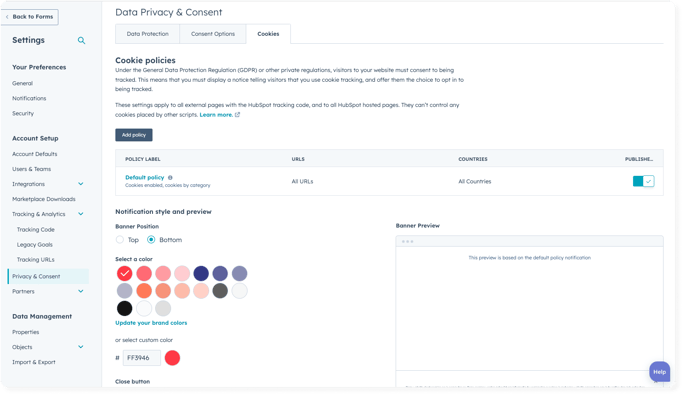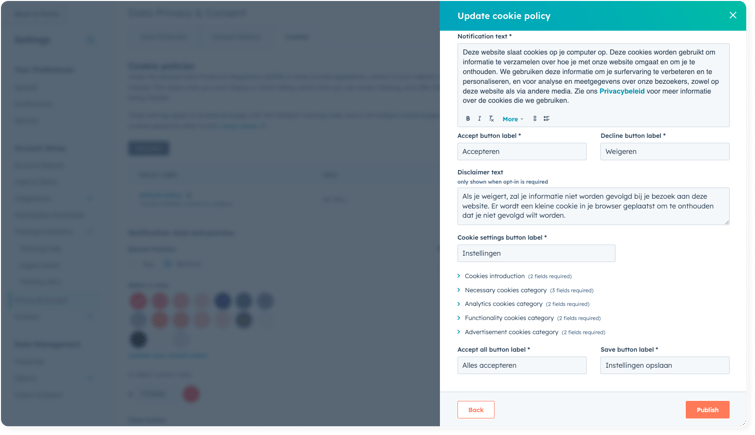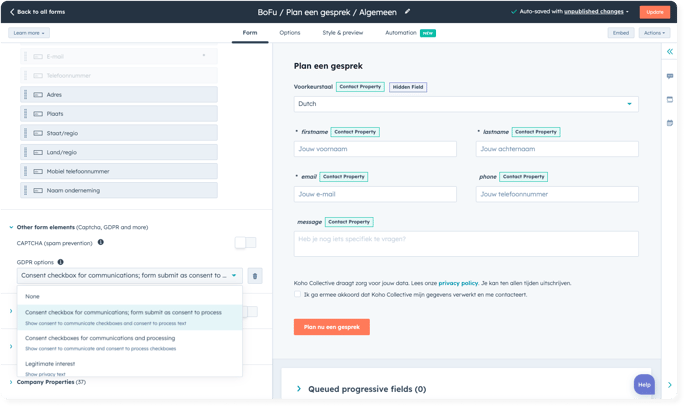HubSpot Gold Partner
Do you have questions about your GDPR and HubSpot?
HubSpot CMS (Content Management System) is a powerful web platform designed for businesses looking to manage, optimize, and expand their online presence. The platform offers a comprehensive set of tools and features, allowing you to easily create and manage attractive websites and landing pages. The platform provides a visual editor that simplifies content creation, editing, and publishing. Additionally, HubSpot CMS offers customisation options, enabling you to display specific content to specific visitors based on their demographic data, location, interests, and behavior.
A significant advantage of HubSpot CMS is its integration with other HubSpot tools, including the CRM system, marketing automation, lead generation forms, analytics, and more. This enables you to optimise your marketing and sales activities and measure and analyze the performance of your website. In summary, HubSpot CMS is a comprehensive web platform that helps your business manage and expand your online presence. It offers advanced tools for content creation, personalisation, and analytics, enabling you to better integrate and optimize your marketing and sales efforts.
With HubSpot, you effortlessly manage your cookie policy while optimising data collection to provide a personalised website experience. Additionally, the implementation of GDPR in HubSpot ensures that users comply with privacy requirements.

Did you know that there are different types of cookies? Each of these different types of cookies has its own specific function and purpose, including:
The use of cookies is subject to strict privacy laws in the European Union, such as the General Data Protection Regulation (GDPR). Websites are required to ask for user consent before storing cookies on their computers, and users must have the option to refuse or delete cookies.
With the HubSpot cookie banner, you can easily allow your users to adjust specific settings for each type of cookie.

Would you like help with your cookies in HubSpot? Or do you have any questions?
As a company, it's crucial to comply with the General Data Protection Regulation (GDPR) guidelines when collecting, processing, and storing customers' personal data. This includes considering how you apply GDPR to forms, documents, and meetings. Providing clear information to the person whose data you are collecting is essential, including:
This information can be included in a privacy statement within the form or document. Additionally, you must ensure that the person whose data you are collecting has explicitly given consent for the use of this information. This can be achieved through an opt-in form where the person provides their consent voluntarily and has the option to withdraw it at any time.

Organising meetings is an essential part of business. With HubSpot, you can efficiently schedule meetings using the HubSpot meeting scheduler or other tools like Calendly. The HubSpot meeting scheduler integrates with your HubSpot CRM and other tools, making it easy to book and manage meetings. Whether scheduling an internal meeting or an external appointment with a client, the meeting scheduler simplifies the process, avoiding unnecessary back-and-forth emails.
However, it's crucial to consider that collecting personal data can impact how you organize meetings. It's essential to protect attendees' personal data and ensure it is not distributed beyond what is necessary. In summary, GDPR compliance should be an integral part of designing forms, documents, and meetings. This not only enhances privacy protection but also contributes to building trust between your company and your customers.
It's important for a company to have clear management of email subscriptions, allowing users to choose the types of emails they want to receive and the ability to unsubscribe from emails they no longer wish to receive. This can be done through a clear and simple unsubscribe link in each email. Clear communication and management of email subscriptions lead to increased customer satisfaction and better engagement from subscribers. The exact types of email subscriptions may vary by company, depending on goals and customer needs.
Do you have questions regarding the different subscription types? Or do you want help to categorise your contacts?
Offering different subscription types allows your audience to receive specific content they are interested in, making your email communication more relevant and valuable to your subscribers. Here are some examples of emails you can send:
Job Candidates Subscription: This email allows interested candidates to stay informed about new job openings, application tips, company news, and other relevant information related to career opportunities within your organisation.
Blog Updates Subscription: Readers can subscribe to your blog and receive regular updates when new blog posts are published. This is an excellent way to keep your audience informed about valuable content and engage them with your thought leadership.
Marketing Emails Subscription: This type of subscription allows people to receive promotional offers, product updates, exclusive discounts, and other marketing-related content. It enables you to send targeted messages to your audience and keep them informed about your products, services, and offers.
Lawfull basis of processing
The lawful basis for processing refers to the legal justification for why a company processes personal data under the General Data Protection Regulation (GDPR).
Under the General Data Protection Regulation (GDPR), companies must have a lawful basis to process personal data. This means that companies need a legal reason to collect, store, use, or share personal data with third parties. The GDPR recognises six different lawful bases for data processing, namely:
Your company must be able to demonstrate which lawful basis you are using for processing personal data. Keeping documentation of consent and other lawful purposes of processing is crucial. The use of HubSpot provides a convenient functionality to incorporate and manage these lawful bases. When creating forms in HubSpot, you can add settings to obtain consent from the data subjects, allowing users to give explicit consent for processing their data.
Additionally, when manually adding a subscription in HubSpot, you also need to record and fill in the consent of the data subject when adjusting the subscription. This ensures that the processing of personal data aligns with legal requirements and that data subjects have control over their data. By utilizing the functionalities built into HubSpot, you can ensure compliance with applicable laws and regulations.
As a company, you have different types of contacts in your database, including marketing and non-marketing contacts. Marketing contacts are individuals who have subscribed to your newsletter or other promotional emails, providing consent to be approached with marketing messages.
Non-marketing contacts are individuals who are customers or have interacted with customer service but have not given consent to be approached with marketing messages. It's important to separate these two types of contacts in your database and use the appropriate opt-ins to comply with GDPR requirements. For marketing contacts, valid consent is necessary, while for non-marketing contacts, legitimate interest may apply to process their data.
Additionally, it's crucial to distinguish between marketing and non-marketing contacts when sending emails. Marketing messages should always be sent to the right opt-ins to avoid sending unwanted emails to the wrong individuals.
In HubSpot, there is a clear separation between marketing contacts and non-marketing contacts. This demarcation even influences the pricing of HubSpot. The pricing for the HubSpot Marketing Hub, which includes email marketing functionalities, is based on the number of marketing contacts. Marketing contacts are those for whom explicit consent has been obtained and who are qualitatively relevant for marketing purposes. This means that HubSpot's pricing is not based on the total number of contacts in HubSpot but on the number of contacts actually considered as marketing contacts. This provides flexibility to use the platform for broader contact management purposes, as you only pay for the marketing contacts actively using it.
By categorising and pricing separately, you can focus on effectively approaching your marketing contacts while optimising the overall costs of using HubSpot. It enables your company to streamline marketing activities, communicate more effectively with marketing contacts, and, consequently, contribute to a more effective marketing strategy and better results.
Double opt-in is a process where a person must sign up twice for an email list or newsletter to confirm their actual interest in your content. In the first step of the process, the person enters their email address and submits a request to sign up. Subsequently, the person receives an email with a link or button to confirm the subscription. Clicking on the link or button confirms that the person is genuinely interested in your content and gives consent to receive emails. Double opt-in is an essential method to ensure that only interested individuals are included in the list and to reduce the likelihood of spam complaints.
As a leading software platform for inbound marketing, sales, and service, HubSpot provides comprehensive support for GDPR compliance to its users. Here are some ways in which HubSpot supports its users concerning GDPR:
In conclusion, HubSpot recognises the importance of GDPR regulations and supports users in meeting their compliance obligations through tools, features, and documentation. By complying with GDPR requirements, HubSpot users can protect their customers' privacy and maintain their business reputation.
With the right knowledge and tools, HubSpot users can remain GDPR-compliant and optimize their efforts while continuing to harness the power of the platform to grow their businesses. Understanding what GDPR entails and its impact on HubSpot users improves your company's data management processes and preserves your customers' trust. In essence, by merging GDPR and HubSpot, you ensure stronger data security, higher customer satisfaction, and ultimately more success in your business operations.
Want to learn more? Schedule a conversation quickly and easily!
Disclaimer: This blog post is not legal advice for your company to comply with EU data privacy laws, such as the GDPR. Instead, it provides background information to help you better understand the GDPR. This legal information is not the same as legal advice, where an attorney applies the law to your specific circumstances, so we insist that you consult with a lawyer if you want advice regarding your interpretation of this information or its accuracy.
In short, you should not rely on this as legal advice or as a recommendation of any particular legal understanding.